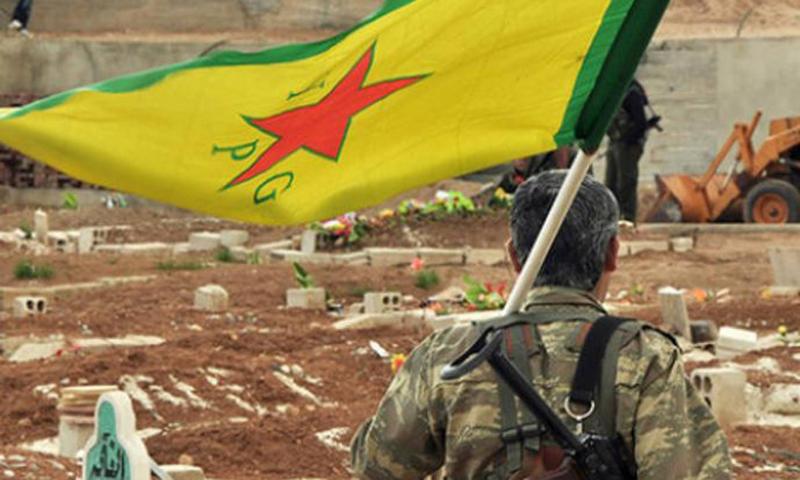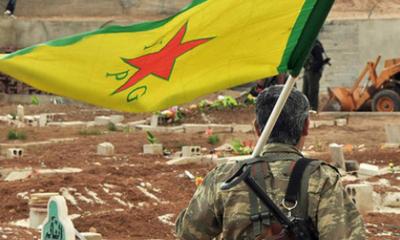The Syrian Kurdish People's Protection Units (YPG), allied with the United States, announced today, Thursday, that Turkish attacks resulted in eight fatalities in an escalation triggered by a bomb attack in Ankara for which Kurdish militants claimed responsibility. A Turkish defense ministry official stated that carrying out a ground operation in Syria is one of the options available to Turkey, which has previously conducted incursions into northern Syria to target the YPG.
The YPG is a key component of the forces allied with the United States in the anti-ISIS coalition. The support provided by the United States and other allies, including France, to the YPG has strained relations with Ankara. Turkey claims that the YPG is a terrorist organization closely linked to the Kurdistan Workers' Party (PKK). Turkey's Western allies classify the PKK as a terrorist group, whereas they do not classify the YPG as such.
### Emergence from the Syrian War
The YPG emerged as a powerful armed group during the Syrian civil war that began in 2011, establishing a foothold in the north as the Syrian government forces withdrew to quell the uprising against President Bashar al-Assad elsewhere. It is aligned with the main Syrian Kurdish faction, the Democratic Union Party (PYD), and has a female counterpart known as the Women's Protection Units.
Initially, the YPG focused its control in three predominantly Kurdish areas in northern Syria, home to approximately two million Kurds. Since the start of the Syrian war, the Kurdish-led authorities have established independent governing bodies in these areas.
### An Ally of the United States
The influence of the YPG expanded as it joined the U.S.-led coalition fighting ISIS, becoming the spearhead of a broader group called the Syrian Democratic Forces (SDF), which played a crucial role in defeating extremists across Syria. As ISIS receded, the territory controlled by the SDF expanded, now representing about a quarter of Syria's area, including oil fields and many areas predominantly inhabited by Arabs. The U.S.-led coalition states that it continues to support the SDF.
### Why Does Turkey Consider the YPG a Threat?
Turkey views the PYD and the YPG as indistinguishable from the PKK, which initiated a rebellion in Turkey in 1984 for the political and cultural rights of Kurds. The conflict has resulted in over 40,000 deaths. The Kurdish minority in Turkey makes up about 15 to 20 percent of the country's approximately 85 million people, primarily living in eastern and southeastern regions bordering Syria. Fearing separatism, Turkey sees the presence of the PYD in Syria as a national security threat. The YPG is deeply influenced by the ideas of PKK leader Abdullah Öcalan, who has been imprisoned in Turkey since 1999 and convicted of treason. Turkey, the United States, and the European Union classify the PKK as a terrorist organization, but Western nations, including Turkey's NATO partners, do not consider the YPG to be a terrorist group. U.S. support for the SDF has been a source of tension with Turkey for years.
Previous Turkish incursions into northern Syria, supported by Syrian Arab armed groups, have brought large areas under their control, including Afrin, which was previously one of the three major Kurdish regions.
### Strained Relations with Damascus
The Ba'athist regime in Syria systematically oppressed Kurds before the war. However, the YPG and Damascus have largely drifted apart during the conflict, notwithstanding occasional clashes. Both have common enemies, including Sunni Arab groups backed by Turkey. The YPG has allowed the government to maintain a foothold in its territories, including control over the al-Qamishli airport. Kurdish leaders claim that their goal is regional autonomy within a decentralized Syria rather than independence. However, Damascus opposes Kurdish autonomy demands, and negotiations between both sides for a political settlement have made no progress.
### Kurdish Groups in the Region
The YPG and the PYD are the main political groupings of Kurds in Syria, but there are various Kurdish groups with different loyalties spread throughout the region. The ruling party in the Kurdistan Regional Government in northern Iraq has close ties with Turkey, which it relies on for oil exports, though its competing partner in government is more critical of Ankara. The PKK has bases in the mountainous regions of northern Iraq.




